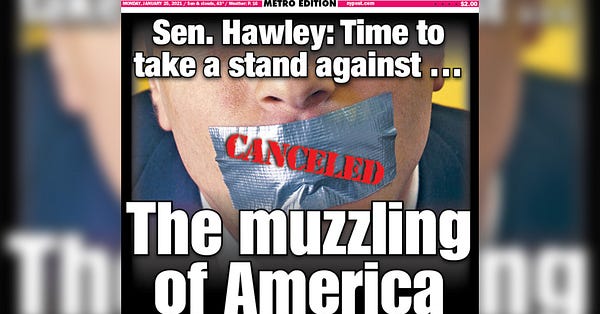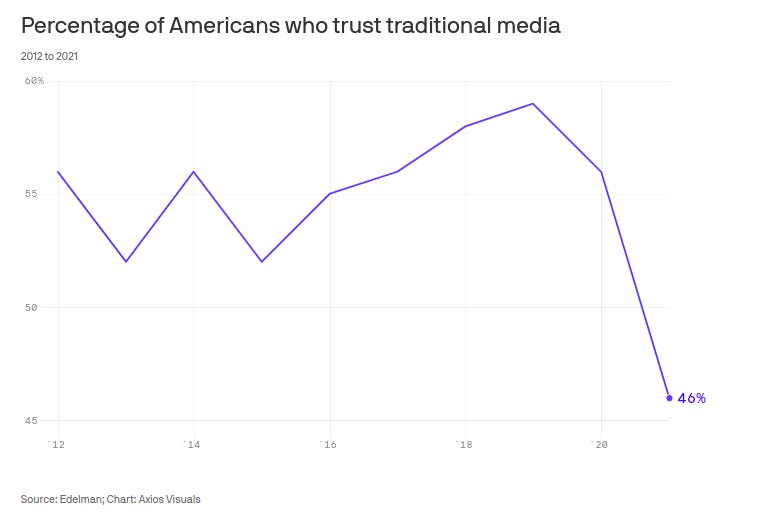The useful myth of "the liberal media"
And why we need to part the clouds of delusion.
One of the most useful myths the American political right has created and wrapped itself up in has been this notion of the “liberal media.” Just by proclaiming that the media is liberal pushes news organizations to trip over themselves to not appear to be liberal.
This is part of what Talking Points Memo’s Josh Marshall called in 2009 “wired.” As in, Washington, D.C. is “wired” for Republicans.
We’re coming off of, or at least we’ve had a period of (because who knows about the future) thirty plus years of conservative dominance of Washington. By some measures you could say forty years. But at least thirty, notwithstanding Bill Clinton’s eight years in office. That conditions a generation of people with mindsets based around Republicans being the party of power, the party whose ideas get vindicated at the polls. Most of all Washington is a city that coddles up to and worships power. But a generation of one party holding the reins selects for certain kinds of journalists in key positions of power, the policy experts at the think tanks who get the journalists calls, the lobbyists who move the most money and so forth. You build up a set of assumptions about what kinds of people and ideas are respectable and which aren’t. Which are old-fashioned, which are ‘cutting edge’ and so forth. Who defines conventional wisdom?
In all of these respects, DC remains overwhelmingly wired for the GOP.
Old habits, they die hard. But this is why useful myths exist. Think of religion’s creation myth, or even the George-Washington-could-not-tell-a-lie myth; myths used to rally around. The idea of liberal media stemmed from the Civil Rights movement, as researcher David Greenberg argues:
In the late 1950s and early 1960s, white Southerners grew resentful toward national journalists who covered the movement, whom they saw as advocating desegregation. Losing the battle for public opinion, Southern spokesmen such as Alabama Governor George Wallace adopted a populistic idiom, promoting the notion that an elite, left‐leaning Northeastern media were distorting the news to fit their politics – an idea that soon, under President Nixon, became conservative dogma.
Sprinkle in the rise and dominance of conservative talk radio in the 1980s, the elimination of the Fairness Doctrine in 1987 and the introduction of the Telecommunications Act of 1996, and here we are: a “liberal” media that is anything but.
Take this ABC News’s frame yesterday:
Of course, the rational way to frame would have been: “two-thirds of the country supports President Biden’s decision to recommit to the Paris Climate Accord and rejoin the World Health Organization.”

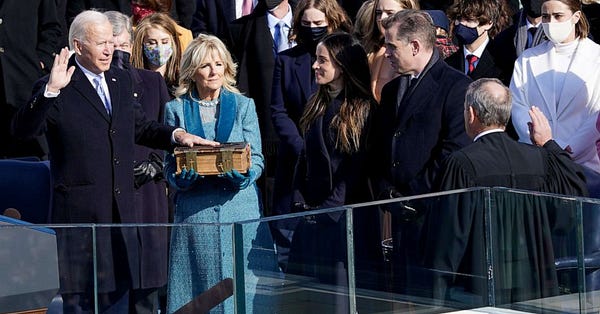
As we’ve talked about frequently, sourcing is a part of this wiring. On Friday, I wrote about Axios giving Kellyanne Conway free rein to rehabilitate her reputation. Over the weekend, CBS News and NBC News did the same with other Trump administration and Republican officials who continually lie to Americans.
Here’s CBS News letting Dr. Birx gaslight viewers by saying, among other things, that she was not an apologist for President Trump.


On Meet The Press, Senators Mike Rounds and Rand Paul continued to use the airwaves to push the “Big Lie.”



And let’s not forget ABC News allowing Chris Christie to reinvent himself. You may recall Chris Christie helped Donald Trump prepare for debates back in October; less than 90-days ago.

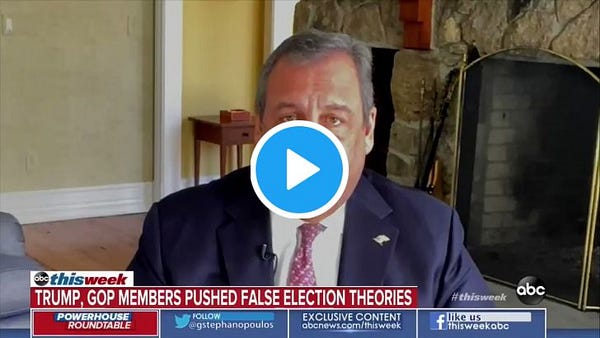
(ABC News also allows Rahm Emanuel to rehabilitate his image.)
On Friday, Congressman Madison Cawthorn was allowed on CNN to continue to push voter fraud lies. At least Pamela Brown swatted his lies down, but he shouldn’t be given all the airtime to begin with.

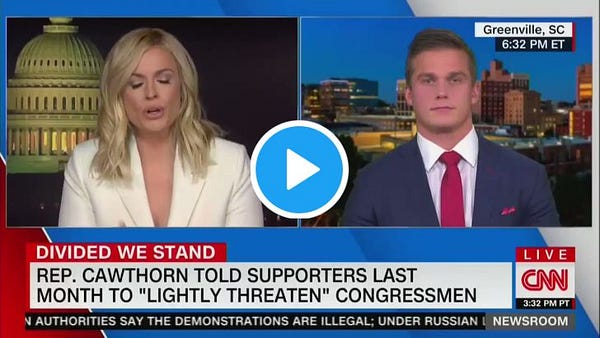
This is why I’ve been arguing for news organizations to take a different approach into covering politics: instead of taking a left/right approach, by taking a ‘is this truth or is it a lie’ approach, you provide readers and viewers with a more accurate view of a moment, helping the citizenry ultimately make better decisions.
Slate argues today that the battle isn’t against Republicans, but instead against liars.
Progressives and conservatives have always quarreled about what’s true. But to make those debates productive, and to correct our country’s mistakes—failed projects, naïve policies, bad wars—we need a common standard for judging truth. That standard can’t be the Bible or identity politics. It has to be the standard we apply in daily life: evidence. If you say the election was stolen, you have to prove it in court. If you accuse a police officer of murder, your story has to withstand investigation.
The Biden White House, while not exactly parroting this logic, makes some points today. Politico reports that the White House sees a battle happening from Trump media coming, as outlets like OAN and Newsmax argue they should be part of the White House Press Corp:
“We expect reporters covering the White House to operate in good faith and tell their audience the truth, and this White House will do the same. We are moving forward with that mutual understanding,” said T.J. Ducklo, the deputy White House press secretary. “Organizations or individuals who traffic in conspiracy theories, propaganda and lies to spread disinformation will not be tolerated, and we’ll work with the WHCA to decide how to handle those instances moving forward.”
If we were to use evidence as our marker, we’d watch ideology drop. But we (as an industry, as a society) are pot-committed to perpetuating lies.
See the above.
But also, look at two other stories that ricocheted around the web yesterday.
One, a New York Times editor was fired. In a case of she said/they said, the editor, through reporting by others, is said to have been let go because of a tweet that showed a positive emotion (“chills”) after watching Biden land in D.C. The New York Times said it wasn’t because of a single tweet. But anyway, the pitchforks came out from bad-faith actors arguing that reporters shouldn’t have feelings. Vox has a good explainer of this story.
The other story: Missouri Sen. Josh Hawley writes a column in the nation’s fourth-largest (by circulation) newspaper, the New York Post, about how he believes he is being censored.
Hawley with more than a half-a-million followers on Twitter; Hawley who can, as a sitting U.S. Senator, have a press conference anytime he wants; Hawley who is writing a book; Hawley who can lead a seditious insurrection is being silenced.
Of course, a liberal media would make sure that a Midwestern Senator wouldn’t be able to write a front page column in a New York City newspaper.
Both of these stories exist because of that useful myth, that the media is liberal. It’s what pushes news organizations to overcompensate when faced with bad-faith arguments from bad-faith actors.
In February, The Verge after watching media flog its own, addressed this phenomena:
These bad faith attacks target what many newsrooms value: fairness and impartiality. But all reporters have opinions and feelings; becoming a journalist does not mean giving up being human. By pretending to speak the language of editorial values, trolls and organized adversaries have baited newsroom leaders into failing to protect their reporters. The objective of online trolls and harassers is to have editorial organizations waste their time by trying to create wedges in their ranks, whether that’s by digging up old tweets or trying to rules-lawyer an organization’s social media policy. They want to intimidate us and have us disavow our colleagues. And they are using “fairness” and “impartiality” to do it.
When trust in media is at an all-time low (46 percent have trust in media), newsrooms have to start reverse-engineering the ‘media is liberal’ myth.
Axios reports on Edelman’s annual trust barometer (yes, yes, the irony of a public relations company that itself often falls short of ‘trustworthy’), even hinting at the useful myth.
Reversing the decline is a monster task — and one that some journalists and news organizations have taken upon themselves. They're going to need help — perhaps from America's CEOs.
The catch: Mistrust of media is now a central part of many Americans' personal identity — an article of faith that they weren't argued into and can't be argued out of.
What they're saying:
Former Financial Times editor Lionel Barber talks of factual reporting as a means of "regaining the trust of the reading public".
Axios has a stated mission to "help restore trust in fact-based news".
Washington Post media columnist Margaret Sullivan writes that "our goal should go beyond merely putting truthful information in front of the public. We should also do our best to make sure it’s widely accepted."
The balancing act for media companies is admittedly tough. It requires a philosophical change in reporting, writing, framing and editing.
It will also require a change in business models. Though it will be hard for outlets to stop taking money from “thought leaders'' so those executives can see their paid byline in their favorite counter-culture magazine. You wanna be on the cover of Rolling Stone? It’ll cost you $2000.
Vanity Fair, writing in 2017, reminds us that the liberal media myth is just that, especially on the business side—something conveniently ignored by those pushing the ‘evil liberal media’ trope. When the largest media organizations and conglomerates are run by right-leaning people or corporations (whether that’s Fox or Sinclair or Tribune; or AT&T or Comcast or Verizon), the waters get muddied.
But the power of caricature is potent and it includes the press as privacy invading, circulation grabbing liberals. That’s always been dubious, especially if you look at corporate ownership. Now, you’ve got not just unceasing consolidation but the unceasing influence of folks of distinctly conservative ideology.
It’s time to dismantle the useful myth that the media is liberal. We’ll be better off, or at the very least, better informed.
Thank you for allowing me in your inbox, today and every day. If you have tips, or thoughts on the newsletter, I encourage you to drop me a line. Or you can follow me on Twitter. If you arrived here via social media or a colleague, please consider signing up. And if you appreciated this edition, please consider sharing it. Thanks for reading, and I’ll see you tomorrow!
Bob Dylan, “Ballad of a Thin Man”
Some interesting links:
For platforms:
Forget TikTok. Clubhouse Is Social Media’s Next Star. (Bloomberg)
Trump Wants Back on Facebook. This Star-Studded Jury Might Let Him. (NYT)
Tech experts overwhelmingly approve of Trump suspensions from social media (WaPo)
For stories about journalists:
Astead Herndon interview: “I Don’t See the Last Four Years as This Journalistic Anomaly” (Slate)
For Super Bowl stories that only matter to us:
Budweiser will sit out this year’s Super Bowl, putting marketing spend towards boosting vaccine awareness (NBC News)
Coke and Pepsi also sitting out the Super Bowl (Variety)
For future of content recommendation:
Taboola going public via SPAC (Business Insider)
For publishers backpedaling on an bad idea:
Forbes drops Bermuda trip for entrepreneurs to escape Covid 'gloom' (The Guardian)




